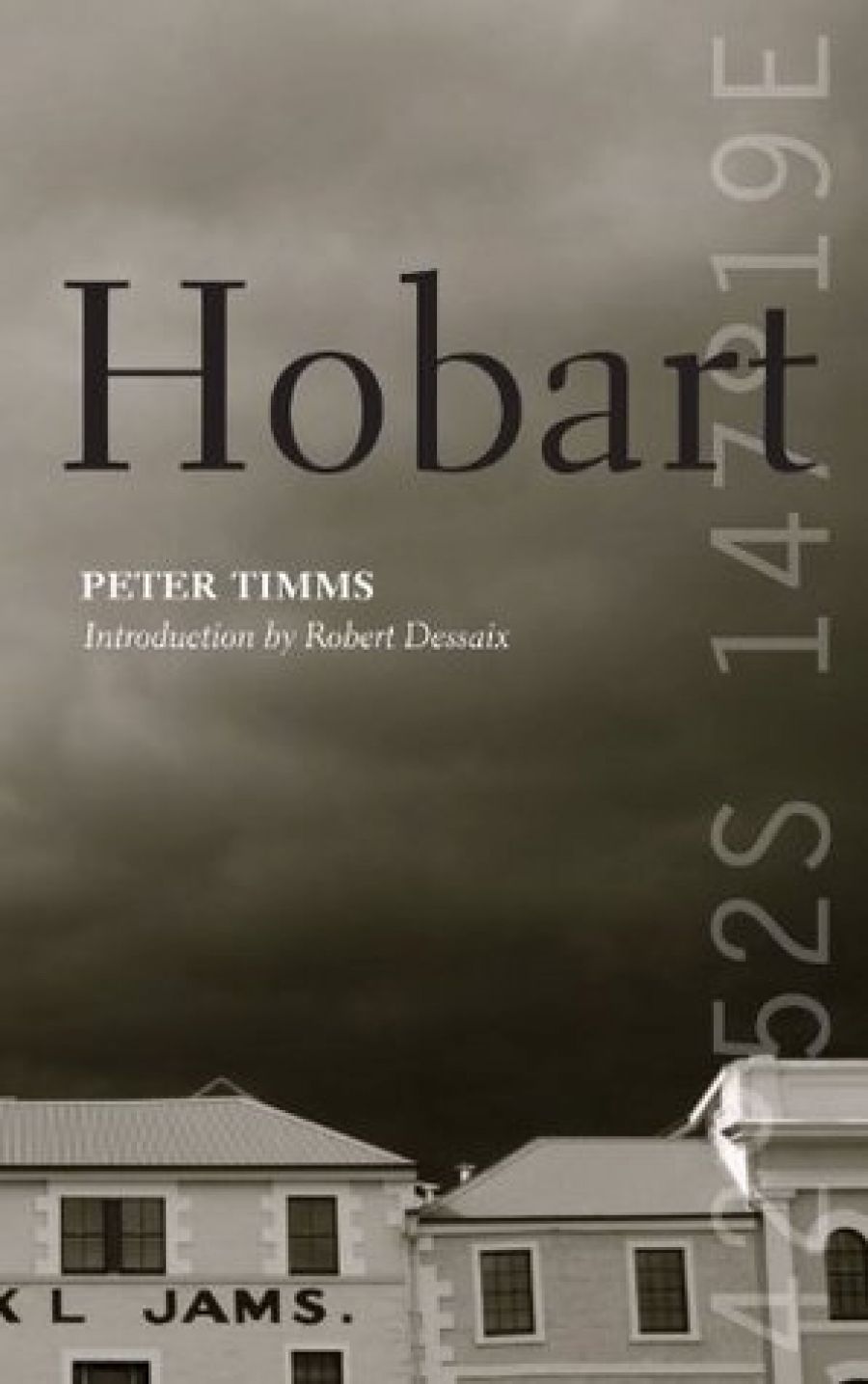
- Free Article: No
- Contents Category: Non-fiction
- Review Article: Yes
- Article Title: Sandstone days
- Online Only: No
- Custom Highlight Text:
I first came to Hobart just over three years ago, to take up a job. Unencumbered and ready for an adventure, I thought nothing of agreeing to the post without ever having visited the Tasmanian capital (or Tasmania, for that matter). The job advertisement included the promise of an ‘idyllic lifestyle’, which sounded pretty good to me.
- Book 1 Title: In Search of Hobart
- Book 1 Biblio: New South, $29.95 hb, 296 pp
I am glad that the CWA shop rates a mention or two in Peter Timms’s In Search of Hobart. I am also glad that he calls to our attention the scents of Hobart, as well as the sights. Inhaling the salty air at Victoria Dock and noticing that the boats moored there – just across the road from the Tasmanian Museum and Art Gallery – were real, working fishing vessels and not touristy replicas was a further epiphany. It gave me an inkling that Hobart had a personality all its own, that it was different from Australia’s other state capitals.
In Search of Hobart is not a history, but it includes the historical. It is not a walking tour, but, in part, takes you up, down and along Hobart’s streets. It is not a tourism pamphlet (indeed, Timms pointedly states that ‘Tourism Tasmania did not agree to be interviewed’), but is altogether more authentic and thoughtful. In the words of Robert Dessaix, Timms’s partner and author of the foreword, In Search of Hobart ‘is a many-voiced conversation about Hobart today’.
Participants in that conversation include the lord mayor, historians, social activists, writers, academics, arts administrators, businesspeople, and plain, everyday folk such as ‘Mick’, a recovering alcoholic who most definitely does not enjoy an idyllic lifestyle in rough-and-tumble Rokeby, a suburb on Hobart’s eastern shore. We also hear from Asian and African migrants, young entrepreneurs, passing tourists, and commentators long dead (Charles Darwin and Anthony Trollope among them).
Timms respects the points of view that are offered, but also exerts the right of the moderator to probe a little deeper, to query certain claims and expose flaws in logic and argument. Facts, opinions, recollections, observations, policies, and plans are the materials from which he constructs an account that moves seamlessly between the past, present, and future. He covers a host of topics, including social and political issues, commerce, industry, the environment, climate, geography, tourism, and the arts. Don’t be put off by my list-making: Timms is a skillful writer with a talent for synthesising information and fashioning it into absorbing prose. What’s more, as an ex-Melburnian, he has the critical perspective of someone who was neither born nor brought up in the Tasmanian capital, and the eye, ear, and nose of the (relative) newcomer who is curious about his adopted city and eager to make sense of it.
For a city and a state that are both obsessed with and deeply ambivalent about their past, In Search of Hobart is refreshingly contemporary. But its contemporaneity is informed by the historical, as it should be. Past and present are nicely encapsulated in the moody image on the dust jacket: a recent photograph of the façade of the former IXL jam factory on Hobart’s waterfront. Founded by Henry (‘I excel in whatever I do’) Jones, the jam factory eventually went out of business, but has been reborn as the smart and stylish Henry Jones Art Hotel, a sign of the direction in which the city is moving, albeit at a glacial pace.
The Henry Jones Art Hotel is within spitting distance of the finish line in the annual Sydney to Hobart yacht race. The Sydney to Hobart doesn’t feature in Timms’s narrative, nor does Cascade beer, and the book is none the poorer as a result. But I’m ever so slightly sorry that there’s no mention of the Bridgewater Jerry. Intrigued? Google it.


Comments powered by CComment